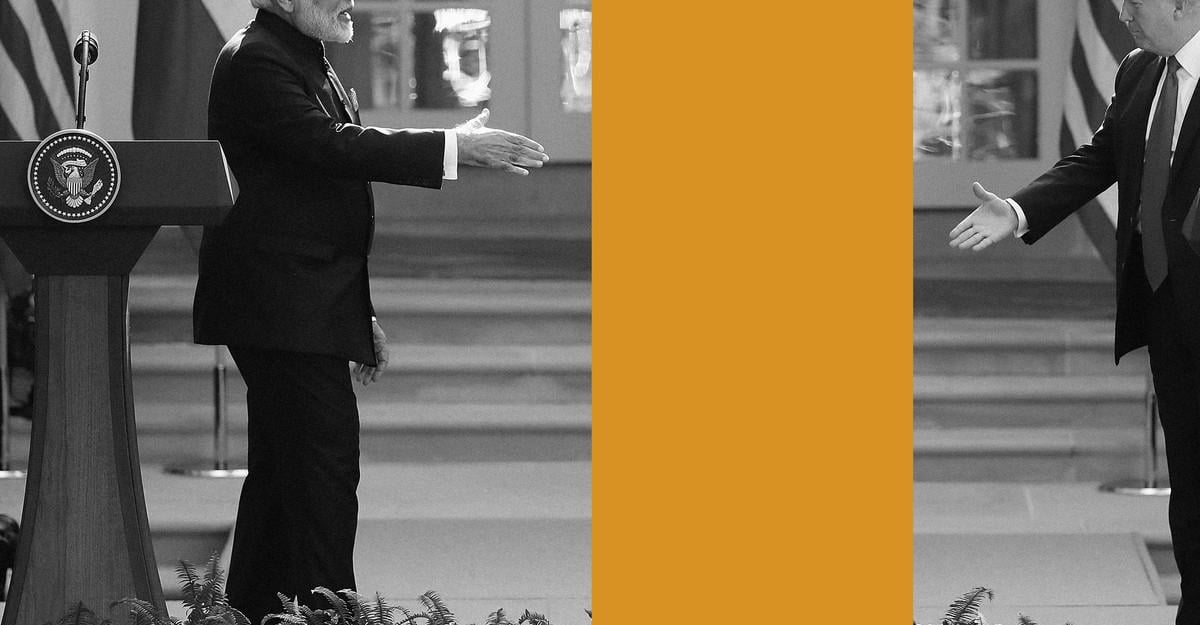
The Real Cost of Tariffs on India
https://www.theatlantic.com/international/archive/2025/09/trump-modi-partnership-undone/684153/?utm_source=reddit&utm_campaign=the-atlantic&utm_medium=social&utm_content=edit-promo
Posted by theatlantic


The Real Cost of Tariffs on India
https://www.theatlantic.com/international/archive/2025/09/trump-modi-partnership-undone/684153/?utm_source=reddit&utm_campaign=the-atlantic&utm_medium=social&utm_content=edit-promo
Posted by theatlantic
3 comments
Vainbhav Vats: “On August 27, President Donald Trump’s 50 percent tariffs on India, some of the steepest he has imposed on any country in the world, went into effect. The levies mark an astounding rupture between the world’s two largest democracies—and a setback for a partnership whose geopolitical significance had been growing.
“The cooperation that took root between India and the United States at the turn of the 21st century centered on shared values: The two countries could together help shore up democracy and human rights in a world where the influence of authoritarian powers, specifically Russia and China, held ever greater sway. Former President Barack Obama described the relationship between the two nations as potentially ‘one of the defining partnerships of the 21st century.’ That was before the politics of both countries began traveling in a more authoritarian direction.
“Trump has brought new turbulence to relations between the U.S. and India. Back in May, the president claimed to have brokered a cease-fire between India and Pakistan following a brief conflict between the two nations. Trump then repeated that claim more than 20 times. Any form of mediation in India’s relationship with Pakistan is a delicate subject in New Delhi, understood as an assault on the nation’s sovereignty; Trump’s boasts opened Prime Minister Narendra Modi to vociferous criticism and boxed him into a defiant, nationalistic position.
“Then, on July 30, Trump announced a 25 percent tariff on India, with additional unspecified penalties on account of India’s purchases of Russian oil and weapons. Modi, in part because he was keen to demonstrate Indian autonomy, showed no inclination to halt those purchases. Trump’s response came a week later, on August 6: He doubled the tariffs to 50 percent.
“…A succession of American presidents and Indian prime ministers, along with diplomats and influential people from both countries, has spent nearly three decades carefully forging an alliance. Now New Delhi is recalibrating—and returning to what is understood in Indian parlance as ‘strategic autonomy,’ a multilateral orientation honed during India’s long decades of nonalignment in the Cold War. What was once envisioned as a vital partnership of the 21st century is fraying—and becoming another source of uncertainty in a world order that seems to be unraveling.”
Read more: [https://theatln.tc/fhsXMsth](https://theatln.tc/fhsXMsth)
Pushing India closer and closer to China doesn’t make any strategics sense for the U.S.
India should mend ties with China. They are neighbors at the end of the day. Like it or not Asian societies have more things common with each other than the west.
Comments are closed.